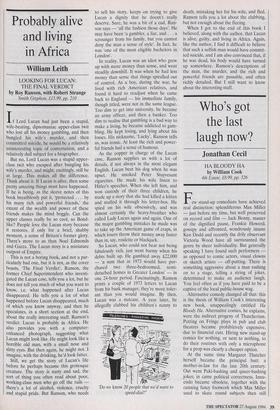Probably alive and living in Africa
William Leith
LOOKING FOR LUCAN: THE FINAL VERDICT by Roy Ranson, with Robert Strange Smith Gryphon, £15.99, pp. 210 If Lord Lucan had just been a stupid, wife-beating, dipsomaniac upper-class twit who lost all his money gambling, and then bungled his wife's murder, and then committed suicide, he would be a relatively uninteresting topic of conversation, and a relatively dull subject for a biographer.
But no, Lord Lucan was a stupid upper- class twit who escaped after bungling his wife's murder, and might, excitingly, still be at large. This makes all the difference, Think about it. If Lucan is alive, then some pretty amazing things must have happened. If he is being, as the sleeve notes of this book breathlessly put it, 'protected . . . by his many rich and powerful friends,' the extent of the wealth and power of these friends makes the mind boggle. Can the upper classes really be so cool, so Bond- like? People love the Lucan story because it restores, if only for a brief, shabby moment, a sense of Britain's former glory. There's more to us than Noel Edmonds and Gazza. The Lucan story is a miniature outpost of Empire.
This is not a boring book, and not a par- ticularly bad one, but it is not, as the cover boasts, 'The Final Verdict'. Ranson, the former Chief Superintendent who investi- gated the Lucan case, tells you a lot, but he does not tell you much of what you want to know, i.e. what happened after Lucan disappeared. He tells you a lot of what happened before Lucan disappeared, much of which you know anyway, and then he speculates, in a short section at the end, about the really interesting stuff. Ranson's verdict: Lucan is probably in Africa. He also provides you with a computer- enhanced photograph, suggesting what Lucan might look like. He might look like a horrible old man, with a small nose and slitty eyes. But then again, he might not. I imagine, with the drinking, he'd look fatter. Still, we get the story of Lucan's life before he perhaps became this grotesque creature. The story is nasty and sad, the sort of thing you often read about poor, working-class men who go off the rails there's a lot of alcohol, violence, cruelty and stupid pride. But Ranson, who needs to sell his story, keeps on trying to give Lucan a dignity that he doesn't really deserve. Sure, he was a bit of a cad, Ran- son says — 'all the fashion those days'. He may have been 'a gambler, a liar, and . . . a scrounger from his family, but you cannot deny the man a sense of style'. In fact, he was 'one of the most eligible bachelors in London'.
In reality, Lucan was an idiot who grew up with more money than sense, and went steadily downhill. It was when he had less money than sense that things spiralled out of control. As a boy, during the war, he lived with rich American relatives, and found it hard to readjust when he came back to England — his immediate family, though titled, were not in the same league. Too dim to get into university, he became an army officer, and then a banker. Too dim to realise that gambling is a bad way to make a living, he became addicted to gam- bling. He kept losing, and lying about his losses. His nickname, 'Lucky', Ranson tells us, was ironic. At least the rich and power- ful friends had a sense of humour.
As the copper in charge of the Lucan case, Ranson supplies us with a lot of details, if not always in the most elegant English. Lucan beat his dog when he was upset. He smoked Peter St uyvesant cigarettes. He made his wife listen to Hitler's speeches. When she left him, and won custody of their three children, he made up a story that she had killed a kitten and stuffed it through his letter-box. He spied on his wife obsessively, and was almost certainly the heavy-breather who called Lady Lucan again and again. One of the major gambling mistakes he made was to take up the American game of craps, in which losers throw their money away faster than in, say, roulette or blackjack.
So Lucan, who could not bear not being fabulously rich, just went barmy when his debts built up. He gambled away £22,000 — 'a sum that in 1973 would have pur- chased two three-bedroomed, semi- detached homes in Greater London' — in one 24-hour period. Fascinatingly, Ranson prints a couple of 1973 letters to Lucan from his bank manager; they're more toler- ant than you would imagine. By then, Lucan was a nutcase. A year later, he allegedly clubbed his children's nanny to
Do we know 20 people that we'd want to speed-dial?'
death, mistaking her for his wife, and fled. Ranson tells you a lot about the clubbing, but not enough about the fleeing.
When I got to the end of this book I believed, along with the author, that Lucan is alive, guilty, and living in Africa. Again, like the author, I find it difficult to believe that such a selfish man would have commit- ted suicide, and I am also convinced that, if he was dead, his body would have turned up somewhere. Ranson's descriptions of the man, the murder, and the rich and powerful friends are passable, and often richly detailed. But I still want to know about the interesting stuff.


























































 Previous page
Previous page